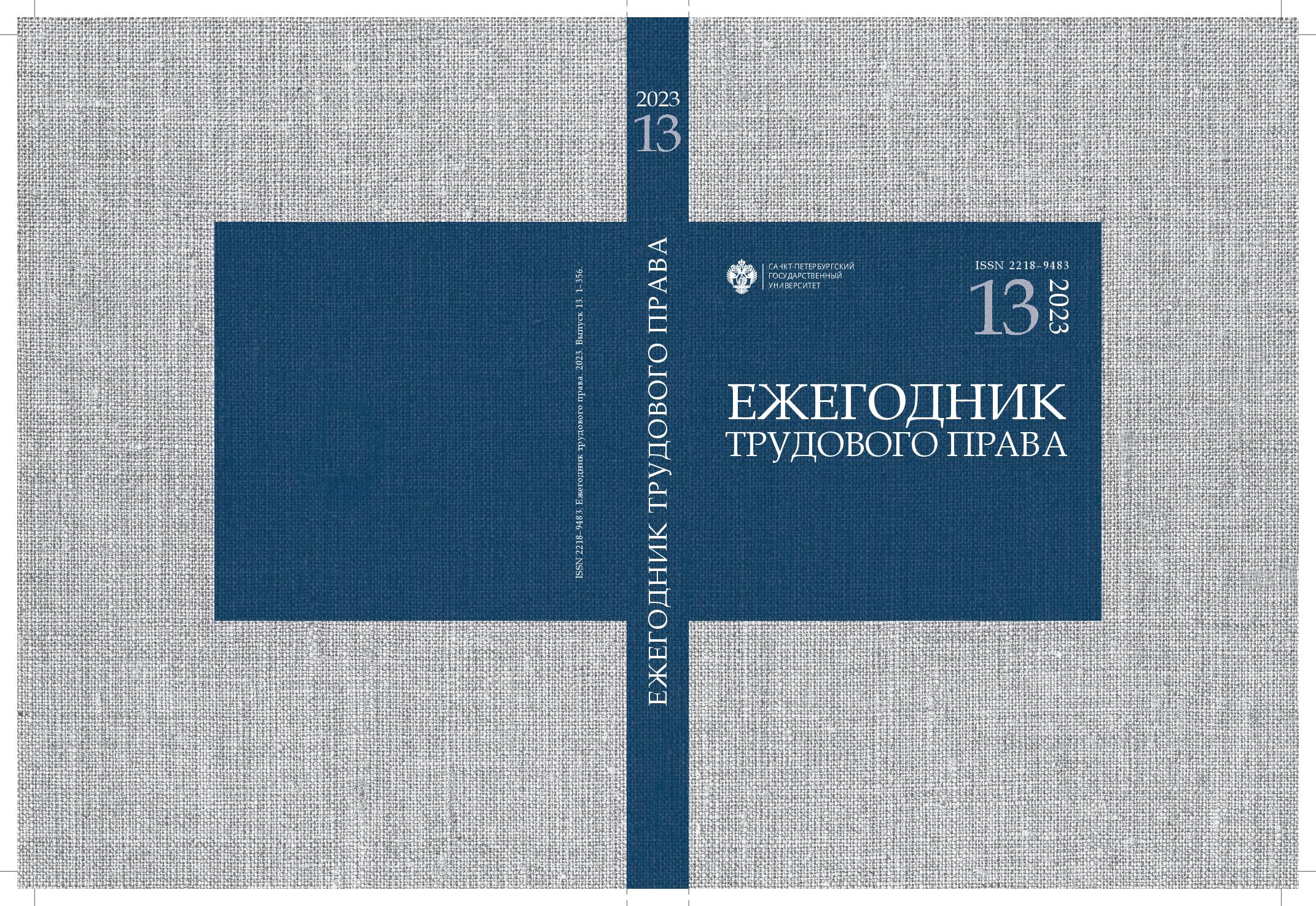Regulation of the work of remote workers: Analysis of judicial practice
DOI:
https://doi.org/10.21638/spbu32.2023.114Abstract
The article is based on the materials of the monitoring of judicial practice. As part of the monitoring, judicial acts of cassation instances in the field of implementation of legislation on the labour of remote workers were analyzed. The problems that most often become the cause of disputes are identified. During the analysis of disputes on the recognition of an employment contract concluded by the parties as a contract on remote work, it was found that the courts attach decisive importance to the actual conditions of employment, rather than the formal consolidation of the relevant conditions in the text of the contract. The problem of assessing the legality of interaction between the parties to an employment contract is also significant, which is determined by the specifics of such interaction, which in most cases involves the active use of telecommunications, information systems, and appropriate technical means. The problem of distinguishing the performance of remote work under an employment contract from the performance of obligations under civil law contracts seems to be relevant. In such cases, there is a contradictory practice based on different interpretations and assessments of factual circumstances. The complexity of the problem in relation to remote work is further aggravated by the fact that the very nature of remote work “blurs” some stable criteria for distinguishing labour and civil contracts (employer authority, employer control, etc.). The authors come to
the conclusion that the existing problems of the practice of applying the norms on remote work are mostly generated not by defects in the legislation itself, but are associated either with individual shortcomings of a specific law enforcement process, or with general problems of the theory of labour law. In this regard, it seems most appropriate to generalize law enforcement practice on this issue and consolidate it at the level of a review of judicial practice or a resolution of the Plenum of the Supreme Court of the Russian Federation.
Keywords:
remote worker, remote labour, remote work, remote work, remote employment
Downloads
References
Библиография
Белицкая, Ирина Я., и Татьяна Ю. Коршунова. 2021. «Хотели как лучше, а получились новые правила дистанционной работы (ч. 1).» Трудовое право в России и за рубежом 3: 20–23.
Закалюжная, Наталия В. 2019. «Основные черты дистанционной занятости.» Трудовое право в России и за рубежом 4: 37–40.
Кораблина, Ольга В. 2020. «Актуальные проблемы перевода работников на труд в дистанционном режиме.» Трудовое право в России и за рубежом 3: 12–15.
Лютов, Никита Л. 2021. «Новые нормы о дистанционном труде: решены ли старые проблемы?» Lex Russica 6 (175): 36–45.
Скачкова, Галина С. 2021. «Дистанционный труд: некоторые вопросы практики применения.» Трудовое право в России и за рубежом 3: 28–31.
Сочнева, Елена Н., и Михаил Е. Червяков. 2021. «Организационно-правовые вопросы дистанционной работы в России.» Евразийский юридический журнал 4 (155): 408–410.
Шуралева, Светлана В. 2019. «Дистанционная работа: сравнительный анализ законодательства государств-участников ЕАЭС (ч. 1).» Трудовое право в России и за рубежом 4: 41–44.
References
Belitskaya, Irina Ya., and Tatyana Yu. Korshunova. 2021. “We wanted the best but got the new remote work rules (part 1).” Trudovoe parvo v Rossii i za rubezhom 3: 20–23. (In Russian)
Korablina, Olga V. 2020. “Current problems of the transfer of employees to remote work.” Trudovoe parvo v Rossii i za rubezhom 3: 12–15. (In Russian)
Lyutov, Nikita L. 2021. “New remote work regulations: have old problems been solved?” Lex Russica 6 (175): 36–45. (In Russian)
Shuraleva, Svetlana V. 2019. “Distance work: A comparative analysis of the laws of the EAEV members states (part 1).” Trudovoe parvo v Rossii i za rubezhom 4: 41–44. (In Russian)
Skachkova, Galina S. 2021. “Remote work: Some issues of the applications practice.” Trudovoe parvo v Rossii i za rubezhom 3: 28–31. (In Russian)
Sochneva, Elena N., and Mikhail E. Chervyakov. 2021. “Organizational and legal issues of telecommuting in Russia.” Evraziiskii iuridicheskii zhurnal 4 (155): 408–410. (In Russian)
Zakalyuzhhnaya, Natalya V. 2019. “The main traits of distance employment.” Trudovoe parvo v Rossii i za rubezhom 4: 37–40. (In Russian)
Downloads
Published
How to Cite
Issue
Section
License
Articles of "Russian Journal of Labour & Law" are open access distributed under the terms of the License Agreement with Saint Petersburg State University, which permits to the authors unrestricted distribution and self-archiving free of charge.




